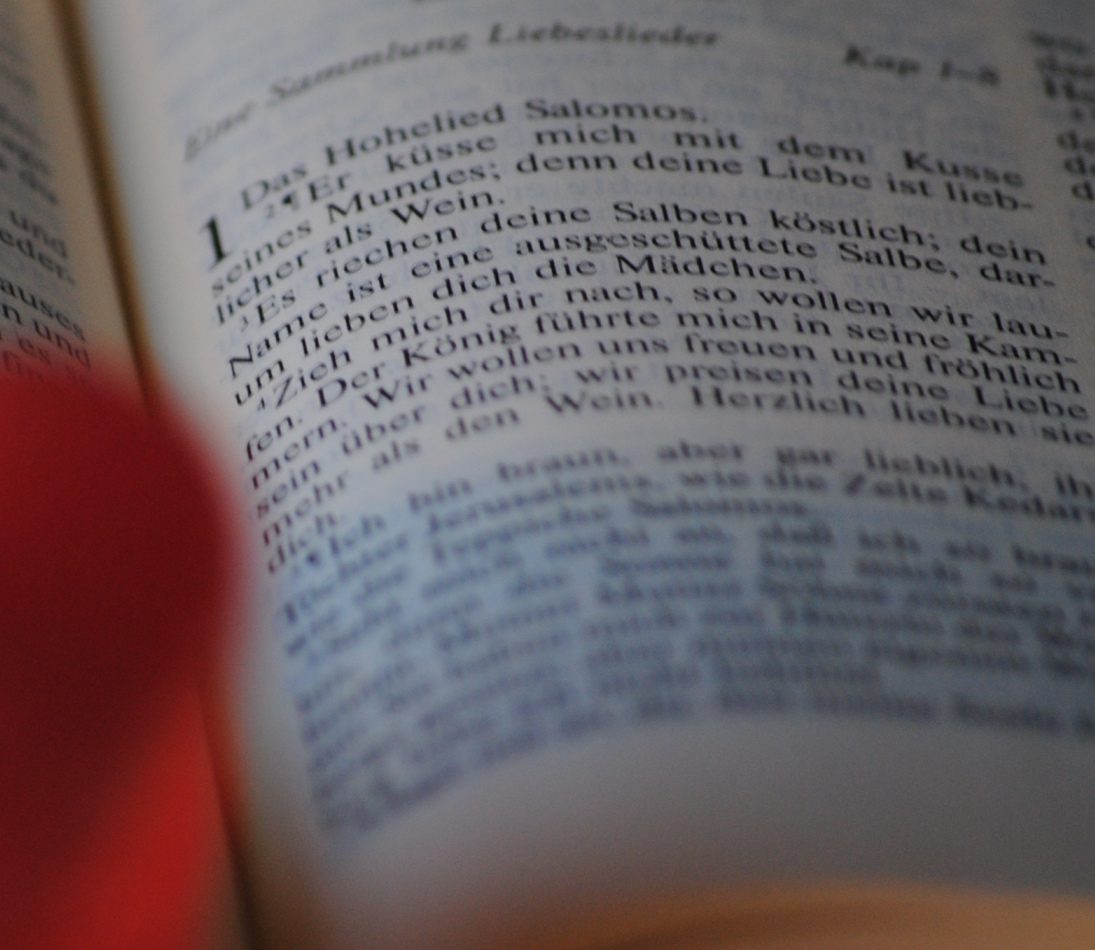Sex in the Bible?
SHE: He shall kiss me with the kisses of his mouth. Yes!
Love is good – better than wine
HE: You are beautiful throughout, my love; there is no flaw in you. Your lips are like a scarlet thread, and your mouth is lovely. Your two breasts are like two fawns, twins of a gazelle, grazing under lotus blossoms.
—
For love is as strong as death, and passion as irresistible as Hades. Its flame is fiery and a mighty flame. Many waters cannot quench love, nor can floods drown it. If a man were to give all the goods in his house for love, he would be laughed at.
In the middle of the Bible are these words, in Song of Songs – a text about the love of two people who were obviously not married. And physical love here is not a vice, but a blossoming, an expression of vitality, a form of love worth singing about.
Sex and Faith
What power sexuality has! Most of us know it and have experienced it ourselves. I ignored all my parents' good advice and concerns back then; my sexual urges were too intense; they were simply so overwhelming—good thing there were already good contraceptives.
It is written in the First Testament, Jesus quoted it: “Therefore a man shall leave his father and his mother and hold fast to his wife, and the two shall a flesh" (Exodus 2:24 and in the New Testament – in the Gospel of Matthew, 19:5).
Pleasure is part of life – and the energy and freedom it brings – and sometimes the hardship, shame and pain.
This sexuality is part of being an adult – dealing with it lovingly, with oneself and with respect for the other person despite or because of all the fire – we don’t learn that overnight.
And: For me, it took more than rules, restrictions, and condemnation of sexuality to be able to deal with it well – and to really enjoy it.
This page is about other perspectives:
Do faith and sex belong together? And if so, how? Or are they mutually exclusive? As a religious person, am I allowed to enjoy sex? Or is the lower body taboo, and should I then remain celibate (i.e., no sex with others, no marriage, no children)?
What does the relationship with the divine mystery have to do with my sexuality?
Experience God at the climax?
Didn't God give us a body and the ability to have sex precisely for this life – in this world?
Shouldn't we then also accept this gift with joy? Isn't it absolutely essential to learn and practice a healthy, conscious approach to our God-given sexuality? And a responsible one?
In the Song of Songs It resonates through – this unbridled joy of life, the enthusiasm, the inner dance. A vitality that is free from control.
In the Garden of Eden, as the story of Adam and Eve tells us, the two initially had no children – but they were naked, made love… and yes, they probably had sex too.
The Spanish mystic Maria de Cazalla (1487- ca. 1534) wrote in the 15th century that she felt unity with God in sexual intercourse. An experience that was almost unbearable for the Catholic Church at the time. The idea that marriage—indeed, even sexuality itself—could be a path to perfection was sharply rejected. Maria de Cazalle was fiercely persecuted. And yet she expressed something that is intuitively familiar to many: Sexuality contains not only power, but also potential spiritual depth.
“Christianity gave Eros poison to drink.
He didn’t die from it, but it degenerated into vice.”- Friedrich Nietzsche
When I first heard this sentence, it was as if someone had put into words what I had long felt. Sexuality is everywhere—in advertising, in jokes, in conversations. And yet, there's often something impure about it. Women are especially sensitive to this: They are either idealized or devalued—saints or whores. And not infrequently, they are blamed for the desires of others.
For centuries—and unfortunately, often even today—religious institutions have portrayed sexuality as sinful or dangerous. In the Christian context, women were often viewed as temptresses. But it's not that simple.
In societies where women are systematically subordinated—whether through religious, cultural, or familial norms—sexualized violence is often not only more common but also more deeply embedded in the system. Studies show that patriarchal structures are a key risk factor for gender-based violence. Source:
Conservative movements in particular tend to condemn lust and love—as if they were the opposite of faith. But I believe it's exactly the other way around.
God created us as sexual beings—with the capacity for intimacy, desire, and love. It wasn't God who demonized sexuality. We humans did that.
“Or do you not know that your body is a temple of the Holy Spirit,
which is in you and which you have from God?"
– 1 Corinthians 6:19
Sexuality is not just an ethical or theological issue. Sexuality is also a spiritual experience—one that connects us to life, to ourselves, and even to God.
Love and passion are spiritual sources.
God's love can also be experienced through sexuality. Maria de Cazalla wasn't the only one who could do this.
Because sexuality has often been poisoned, it's often difficult for us to transcend all the prejudice, devaluation, and shame and to deal with our desires and longings in a positive way. Regardless of whether we approach sexuality cautiously or passionately, it's important that it takes place between equals. And no one should interfere with what they then agree on.
Don't force it, but respect a no so that the yes can be lived.
Combining sexuality and spirituality is not only possible, but also deeply enriching and – exciting!
In his book Your kisses enchant me – love and passion as spiritual sources. Pierre Stutz shows powerful and tender ways in which this connection can succeed.
Spirituality as a love experience
Mystics of all ages have described how closeness to God sometimes feels like a rush of love—ecstatic, overwhelming, tender. John of the Cross, Teresa of Ávila, Mechthild of Magdeburg: They all spoke of God in the language of love.
Here is the famous poem (1579) by John of the Cross (1542-1591), Spanish mystic, Carmelite and poet.
The dark night of the soul
In the night of stars only,
burning with love, directed towards the goal –
O wondrous fate! –
I escaped unseen,
leaving my house in silence, deeply appeased.Deep in the womb of darkness,
hidden steps along, disguised, rewritten –
O wondrous fate! –
at night, destroyed by every glance,
leaving my house in silence, deeply appeased!Secret, in magic rings
the darkness, where no one recognized me,
where I saw nothing of things
and nothing sent me rays
as that guiding light that burned in the heart!That guided me, that brought
me better than the day, which was bright blue,
to the destination where mine was waiting
he, the deeply confidant –
to the destination, where I saw nothing apparent.O night, you fair one,
O night, that watched more beautifully than the dawn:
O night that loved me
to the minted,
which made me a minted one!
*Minne Middle High German for love (cf. Minnegesang)





